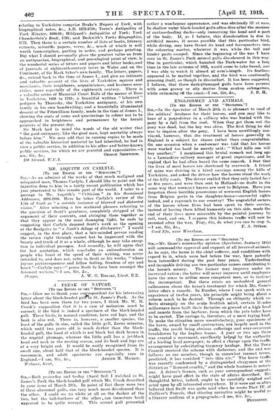ENGLISHMEN AND A-NIMALS.
[To THE .EDITOR OF run "SPECTATOR.") Sur,—In the Spectator of March 29th it is pleasant to read of the soldiers fondness for their hereee, and you may like to hear of a pony-driver in a colliery who was buried with the pony by a fall from the roof. When they got them out the pony was dead, but the boy was alive. The first thing he did wits to inquire after the pony, I have been unwillingly con- vinced, however, that the treatment of- horses generally in England is a subject for shame rather than congratulation. On one occasion when a coal oweeer was told that his horses were worked too hued he merely said : " Whet kills one will buy another." I meutioned this brutal remark mot long ago to a Lancashire colliery manager of great experience, and he replied that he had often heard the Came remark. I fear that the lives of most horses are shortened by overwork. A friend of mine was driving in a hired carriage among the hills of Yorkshire, and asked the driver hew the homes stood the work of the hilly roads. The driver replied that they only lasted four or fire years, and were then sent to Holland—no doubt in- the game way that worn-out hones are sent 'to-Belgium. Epee you forgotten those horrible processions of worn•out English-horses from Belgian ports to the slaughterdvonse—sorrowful sights indeed, and a reproach to our countryP The ungrateful owners of the horses whose lives had been spent in their service, instead of having them killed humanely on tide side, made the end of their lives more sniscreble by the painful jonrney by rail, road, and sea. I mimes this hideous traffie-will now be resumed after the war. Pray, Sir, do what you can to•stop it.



































 Previous page
Previous page